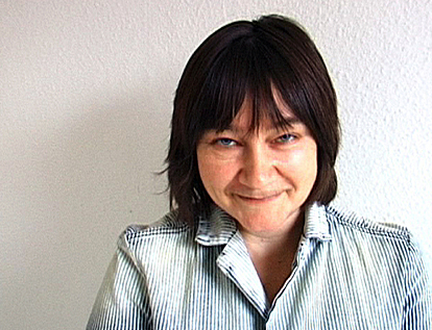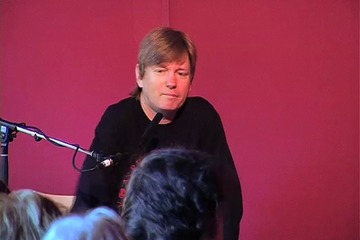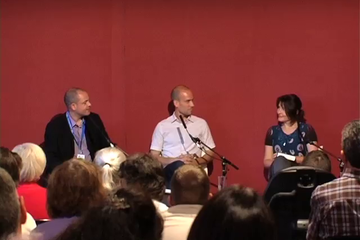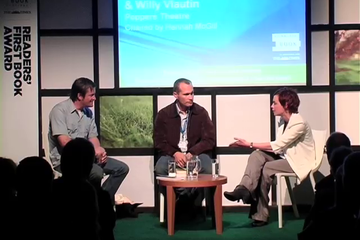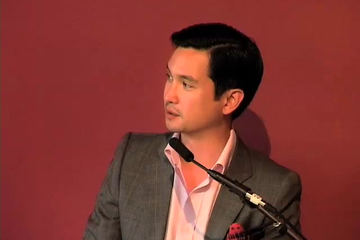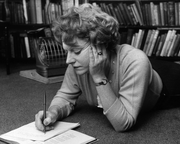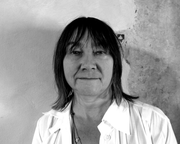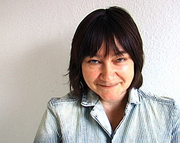The art of elsewhere
By Ali Smith
We have commissioned a new piece of writing from fifty leading authors on the theme of 'Elsewhere' - read on for Ali Smith's new story.
I’ve been trying to go elsewhere all my life.
Last year, I went all over the place. I went to Greece, I went to France, I went to Holland, I went to Morocco, I went to Canada, I went to Germany. That’s just some of the places I went to. I flew, I cycled, I went on Eurostar, I went by ordinary train, I walked, I got the bus, I drove, I sat in the backs of a lot of taxis. Wherever I went, however I went, there was no getting away from it. I would put my bag down on the cobbles, or the pavement, or the grassy side of the road, or the walkway next to the canal, or the plastic-strewn beach, or the railway station platform, or the bed, or the folding table-thing made of canvas and aluminium that some hotels have especially for suitcases, and, where would I be?
I’d be sitting on a bench in a pretty garden high up the side of a fairly-built-up slope above the city of Naples. If you looked up you’d not see Vesuvius at all, because of the pollution. And if you looked down, you’d know Naples was down there, and you’d be able to hear the crazy hooting and roaring of the traffic, but because of the pollution it was like Naples didn’t exist.
Beautiful, I’d say to myself.
I mean Rotterdam was lovely. It’s got some great galleries. I particularly liked the medieval Madonna and Child with the tiny golden angels radiating out in interwoven rings round them both, playing golden musical instruments, forming a series of hoops of light, like vibrations or aura are emanating from them, and under her feet she’s crushing a long thin black monstrous-looking thing, a kind of devil I suppose it’s meant to be. And when I stood and looked at the painting, a painting as small as my own hand, of a pile of beautiful old books on a table and one book propped up and open at a double page, blank but for the figure of a man standing at the far end holding a spade, as if the blank pages were a field waiting to be farmed, for a moment, for a few seconds, looking at that picture, I was both right there in front of it and I was elsewhere.
Also, the gallery had a very lovely café/restaurant; there was leek soup the day I went, very nice, and even its toilets are works of art, with little plaques outside them like paintings have next to them for their title/artist information.
But pretty much the whole time I was there, I was still trying to get elsewhere.
*
There was a girl I knew when I was at school; her name was Debbie and her dad was famously elsewhere.
That meant he was doing time, my mother told me; it was well-known among the parents that Debbie’s father, from time to time, did time. Her mother worked at the petrol station where my elder brother worked the car-wash on Saturdays and Sundays, and this, along with a kindly demeanour, meant that Debbie, who was quite a tough sort of girl, and the kind who failed exams or tended to do averagely, was protective of me if I ever came under threat from the little gangs of girls who’d hang around the school gates, waiting to slap the face of a swot.
We had sewing class last thing on a Friday and for this we were seated alphabetically, which meant that Debbie and I were put next to each other. Because she knew I liked books she told me about her favourite book, which was The Railway Children by E. Nesbit. The film is good, yeah, she said, but the book is much, much better. Then she lent me it, and was so delighted, when I gave it back to her, that I’d liked it as much as she had, that she actually did my sewing for me for weeks; she’d do her own double-quick then give me hers to hold, and work away at mine under the table, right under the sewing teacher’s nose. It was the only term in my life that I ever got a good mark in sewing. Once, in an English class, our teacher, who called himself the Gaelic version of his name and was known for his ritual of firing a cannon and raising a saltire in his back garden every year at New Year, and who still wore a black gown to teach in, which no one else in the whole school did, and who always gave himself the best parts when we read Shakespeare round the class, and who despised Debbie for some reason, presumably because the staff, like the parents, knew about her dad and his doing time, told us all to open our poetry books at a poem by Rudyard Kipling called If. Then he said that the first one of us to stand up and recite, word-perfect, the whole thing off by heart could leave the class and go to lunch early.
It was the kind of cheap thing a teacher did when he didn’t really want to teach the class that period. I thought about what I’d do with the time, if it was me who learned the words the fastest. Since there was nobody at home till one o’clock there’d be no point in me leaving school half an hour early, because I didn’t have a key for the house and I’d have to sit in the garden until one of my parents got home from work, and the dog would hear me and start barking to get out, and anyway it was raining, but if the shed was unlocked, I could sit in the shed and wait. Okay.
But I had barely started reading the poem, barely got to the end of its second line, when someone at the back of the class pushed a chair back and stood up. We all turned.
Face the front, old Caimbeul shouted.
Facing the front, we all heard Debbie begin at the beginning. If you can keep your head when all about you. Are losing theirs and blaming it on you. I followed the poem in the book in front of me through all four of its verses. She was word-perfect. She ended at the end. You’ll be a man, my son, she said.
Then she picked up her bag and walked between the desks to the front of the class.
Ah, but you didn’t learn that here in this classroom today, though, did you, em, eh, –, old Caimbeul, who was flustered and had misplaced Debbie’s name, said.
My father says it into the mirror every morning when he shaves, Debbie said. And you never said anything about us not being allowed to know it already.
She swung out the door without looking back. The door clicked shut. We were all left behind.
Debbie had gone elsewhere.
*
Elsewhere there are no mobile phones. Elsewhere sleep is deep and the mornings are wonderful. Elsewhere art is endless, exhibitions are free and galleries are open twenty-four hours. Elsewhere alcohol is a joke that everybody finds funny. Elsewhere everybody is as welcoming as they’d be if you’d come home after a very long time away and they’d really missed you. Elsewhere nobody stops you in the street and says, Are you a Catholic or a Protestant, and when you say neither, I’m a Muslim, then says yeah but are you a Catholic Muslim or a Protestant Muslim? Elsewhere there are no religions. Elsewhere there are no borders. Elsewhere nobody is a refugee or an asylum seeker whose worth can be decided about by a government. Elsewhere nobody is something to be decided about by anybody. Elsewhere there are no preconceptions. Elsewhere all wrongs are righted. Elsewhere the supermarkets don’t own us. Elsewhere we use our hands for cups and the rivers are clean and drinkable. Elsewhere the words of the politicians are nourishing to the heart. Elsewhere charlatans are known for their wisdom. Elsewhere history has been kind. Elsewhere nobody would ever say the words bring back the death penalty. Elsewhere the graves of the dead are empty and their spirits fly above the cities in instinctual, shapeshifting formations that astound the eye. Elsewhere poems cancel imprisonment. Elsewhere we do time differently.
Every time I travel, I head for it. Every time I come home, I look for it.
Look, Listen & Read
- 2026 Festival:
- 15-30 August
Latest News
 Major new partnership with Celtic Connections
Major new partnership with Celtic Connections

